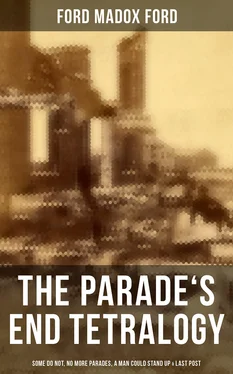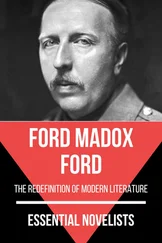Tietjens swore with the extreme vehemence of a man who has been made, but who much dislikes being seen, to start.
Macmaster—in evening dress he looked extremely miniature!—said:
‘I’m sorry, old man, I know how much you dislike being interrupted. But the General is in a terrible temper.’
Tietjens rose stiffly, lurched over to an eighteenth-century rosewood folding washstand, took from its top a glass of flat whisky and soda, and gulped down a large quantity. He looked about uncertainly, perceived a notebook on a ‘Chippendale’ bureau, made a short calculation in pencil and looked at his friend momentarily.
Macmaster said again:
‘I’m sorry, old man. I must have interrupted one of your immense calculations.’
Tietjens said:
‘You haven’t. I was only thinking. I’m just as glad you’ve come. What did you say?’
Macmaster repeated:
‘I said, the General is in a terrible temper. It’s just as well you didn’t come up to dinner.’
Tietjens said:
‘He isn’t . . . He isn’t in a temper. He’s as pleased as punch at not having to have these women up before him.’ Macmaster said:
‘He says he’s got the police scouring the whole county for them, and that you’d better leave by the first train tomorrow.’
Tietjens said:
‘I won’t. I can’t. I’ve got to wait here for a wire from Sylvia.’
Macmaster groaned:
‘Oh dear! oh dear!’ Then he said hopefully: ‘But we could have it forwarded to Hythe.’
Tietjens said with some vehemence:
‘I tell you I won’t leave here. I tell you I’ve settled it with the police and that swine of a Cabinet Minister. I’ve mended the leg of the canary of the wife of the police-constable. Sit down and be reasonable. The police don’t touch people like us.’
Macmaster said:
‘I don’t believe you realise the public feeling there is . . . ’
‘Of course I do, amongst people like Sandbach,’ Tietjens said. ‘Sit down I tell you . . . Have some whisky . . . ’ He filled himself out another long tumbler, and, holding it, dropped into a too low-seated, reddish wicker armchair that had cretonne fixings. Beneath his weight the chair sagged a good deal and his dress-shirt bulged up to his chin.
Macmaster said:
‘What’s the matter with you?’ Tietjens’ eyes were bloodshot.
‘I tell you,’ Tietjens said, ‘I’m waiting for a wire from Sylvia.’
Macmaster said:
‘Oh!’ And then: ‘It can’t come to-night, it’s getting on for one.’
‘It can,’ Tietjens said, ‘I’ve fixed it up with the postmaster—all the way up to Town! It probably won’t come because Sylvia won’t send it until the last moment, to bother me. None the less, I’m waiting for a wire from Sylvia and this is what I look like.’
Macmaster said:
‘That woman’s the cruellest beast . . . ’
‘You might,’ Tietjens interrupted, ‘remember that you’re talking about my wife.’
‘I don’t see,’ Macmaster said, ‘how one can talk about Sylvia without . . . ’
‘The line is a perfectly simple one to draw,’ Tietjens said. ‘You can relate a lady’s actions if you know them and are asked to. You mustn’t comment. In this case you don’t know the lady’s actions even, so you may as well hold your tongue.’ He sat looking straight in front of him.
Macmaster sighed from deep in his chest. He asked himself if this was what sixteen hours’ waiting had done for his friend, what were all the remaining hours going to do?
Tietjens said:
‘I shall be fit to talk about Sylvia after two more whiskies . . . Let’s settle your other perturbations first . . . The fair girl is called Wannop: Valentine Wannop.’
‘That’s the Professor’s name,’ Macmaster said.
‘She’s the late Professor Wannop’s daughter,’ Tietjens said. ‘She’s also the daughter of the novelist.’
Macmaster interjected:
‘But . . . ’
‘She supported herself for a year after the Professor’s death as a domestic servant,’ Tietjens said. ‘Now she’s housemaid for her mother, the novelist, in an inexpensive cottage. I should imagine the two experiences would make her desire to better the lot of her sex.’
Macmaster again interjected a ‘But . . . ’
‘I got that information from the policeman whilst I was putting his wife’s canary’s leg in splints.’
Macmaster said:
‘The policeman you knocked down?’ His eyes expressed unreasoning surprise. He added: ‘He knew Miss . . . eh . . . Wannop then!’
‘You would not expect much intelligence from the police of Sussex,’ Tietjens said. ‘But you would be wrong. P.C. Finn is clever enough to recognise the young lady who for several years past has managed the constabulary’s wives’ and children’s annual tea and sports. He says Miss Wannop holds the quarter-mile, half-mile, high jump, long jump and putting the weight records for East Sussex. That explains how she went over that dyke in such tidy style . . . And precious glad the good, simple man was when I told him he was to leave the girl alone. He didn’t know, he said, how he’d ever a had the face to serve the warrant on Miss Wannop. The other girl—the one that squeaked—is a stranger, a Londoner probably.’
Macmaster said:
‘ You told the policeman . . . ’
‘I gave him,’ Tietjens said, ‘the Rt. Hon. Stephen Fenick Waterhouse’s compliments, and he’d be much obliged if the P.C. would hand in a ‘No Can Do’ report in the matter of those ladies every morning to his inspector. I gave him also a brand new fi’ pun note—from the Cabinet Minister—and a couple of quid and the price of a new pair of trousers from myself. So he’s the happiest constable in Sussex. A very decent fellow; he told me how to know a dog otter’s spoor from a gravid bitch’s . . . But that wouldn’t interest you.’
He began again:
‘Don’t look so inexpressibly foolish. I told you I’d been dining with that swine . . . No, I oughtn’t to call him a swine after eating his dinner. Besides, he’s a very decent fellow . . .
‘You didn’t tell me you’d been dining with Mr Waterhouse,’ Macmaster said. ‘I hope you remembered that, as he’s amongst other things the President of the Funded Debt Commission he’s the power of life and death over the department and us.’
‘You didn’t think,’ Tietjens answered, ‘that you are the only one to dine with the great ones of the earth! I wanted to talk to that fellow . . . about those figures their cursed crowd make me fake. I meant to give him a bit of my mind.’
‘You didn’t !’ Macmaster said with an expression of panic. ‘Besides, they didn’t ask you to fake the calculation. They only asked you to work it out on the basis of given figures.’
‘Anyhow,’ Tietjens said, ‘I gave him a bit of my mind. I told him that, at threepence, it must run the country—and certainly himself as a politician!—to absolute ruin.’
Читать дальше












